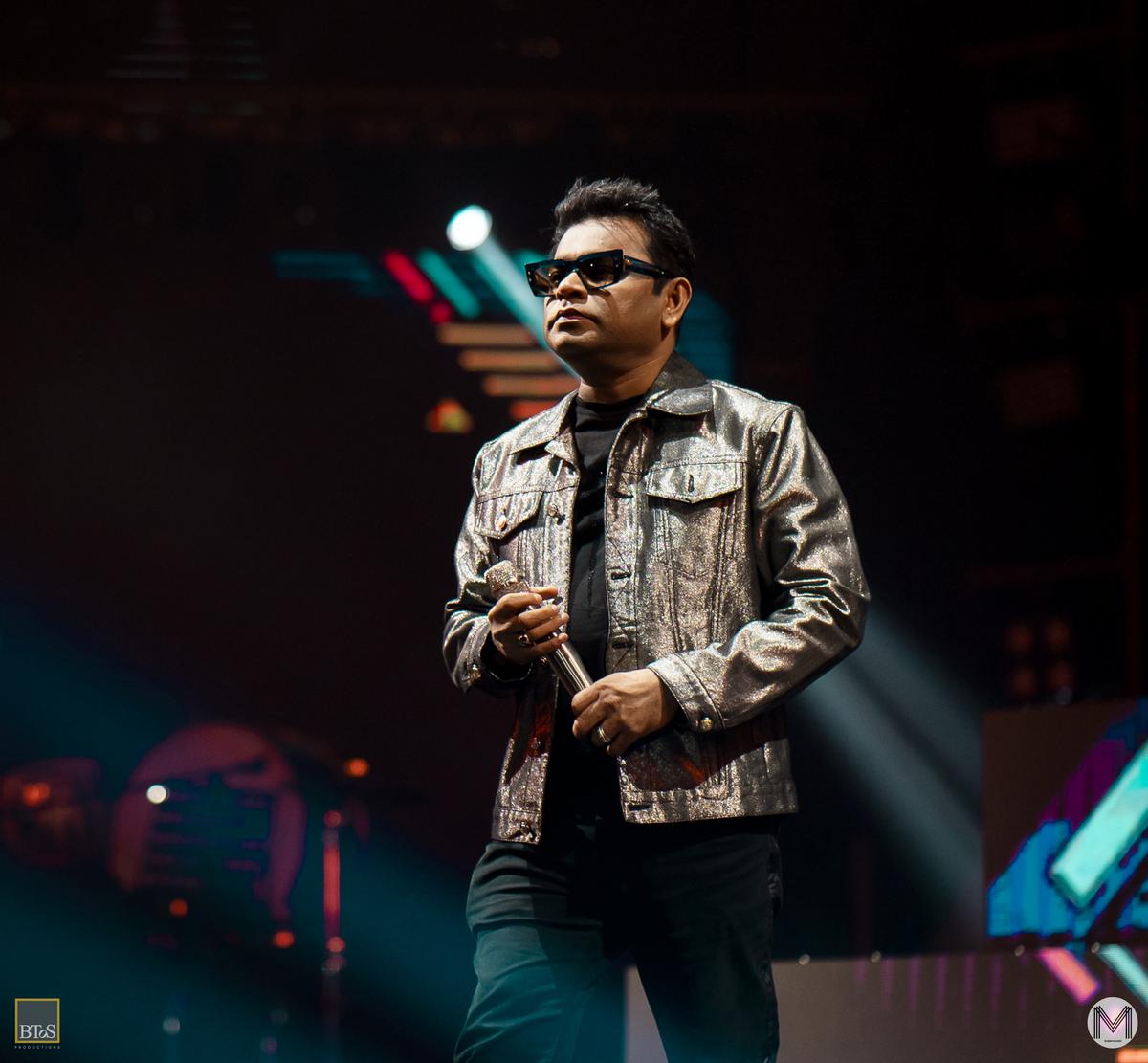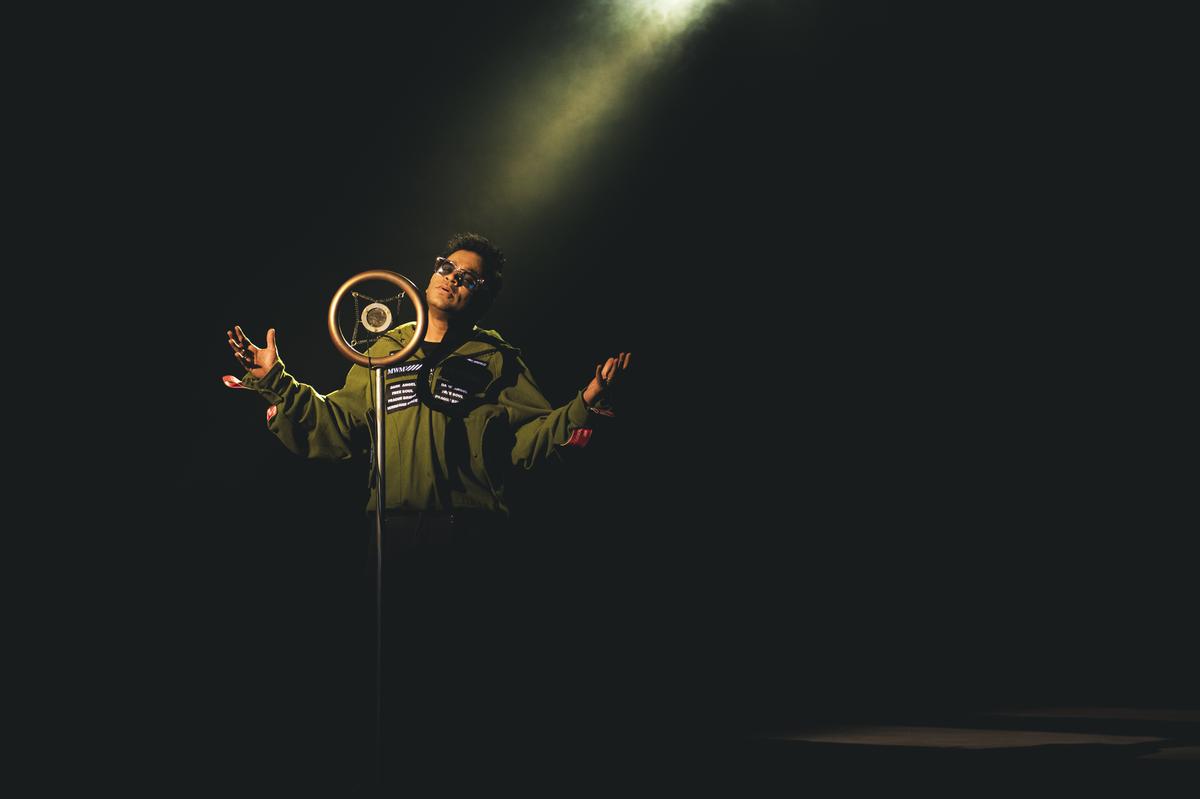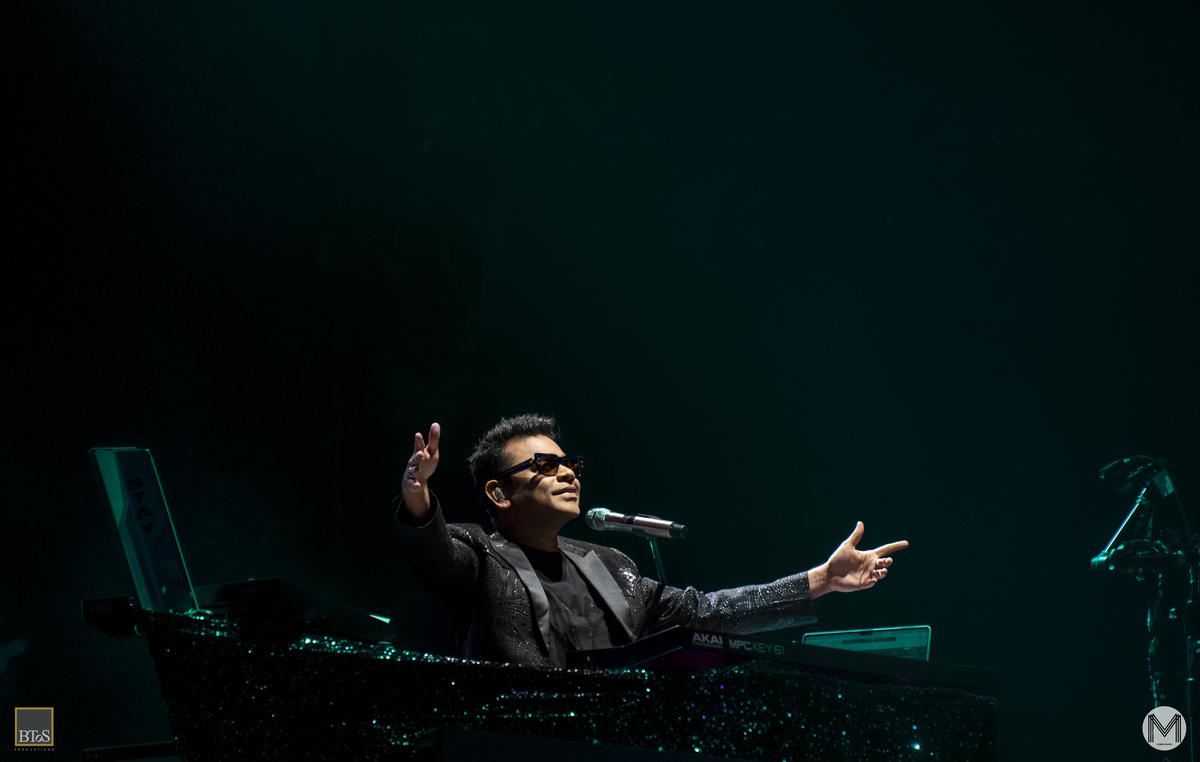Watch | AR Rahman: ‘I asked Kamal Haasan to make a Hollywood film, just for the heck of it’
It felt a bit surreal when pictures of AR Rahman and Kamal Haasan visiting the Academy Museum of Motion Pictures in Los Angeles surfaced online last month; the two visionaries were immersed in checking out iconic moments from the Academy Awards over the years, including Rahman’s dual Oscar wins from 2009 before catching a screening of The Godfather.

A. R. Rahman is set to perform in Chennai this weekend on August 12
“We visited the Chinese Theatre and watched Oppenheimer too. I invited him over for lunch after that,” recalls Rahman. “He is someone who comes from six generations of filmmaking, and hearing him talk and narrate stories is always fascinating to me. He still watches so many movies, remembers scenes and dialogues from them, and keeps pointing out trivia to me. Unlike him, I don’t have the patience anymore to finish every film!”
Rahman is composing for Kamal’s next directed by Mani Ratnam, which is set to be a collaboration for the ages. How has his equation with the Ulaganayagan evolved since he first composed for the actor in Indian (1996)?

ARR and Kamal Haasan at the Academy Museum of Motion Pictures
“I feel like he got trapped in this industry over the years. It’s a good thing for us; but for him… I don’t know. 20 years ago, when he had the money, he should have just gone to Hollywood and made a film there. As an experiment perhaps, without worrying about success or failure. He can still do it actually. That’s what I told him now; to make an English film just for the heck of it and not be judgemental about it,” Rahman says lightly.
Of his love for concerts and Chennai
At the moment though, he is not thinking about composing for Mani Ratnam or Kamal Haasan; ARR is busy rehearsing for his upcoming twin Marakkuma Nenjam concerts in Chennai and Coimbatore. The first of these two, in Chennai, is scheduled to be held this weekend on August 12.
“Now, concerts are needed more than ever. In this time and age, if you’re a singer with a particular quality, AI can analyse your voice, mix it and reproduce it. But when audiences come and see performers in the flesh, they notice a singer’s actual voice with all its imperfections and flaws; that really helps them connect. The interactive nature of it, the vibes, the energy… it’s more relevant now than ever before to support live music,” he avers.
Rahman adds that he is also constantly trying to reinvent concerts and make them more interesting: “I remember watching live acts from other cultures, and wondering why only our singers need books in front of them to perform. I was terrified to break such practices back then, but now we have come a long way.”

Rahman says that he is also constantly trying to reinvent concerts and make them more interesting
He is performing in the city after an extended period; Chennaiites have never missed him more. It is interesting that Rahman, even during the heights of his international collaborations — many of which are still active — never considered moving abroad, or even to Mumbai, where Bollywood has eagerly coveted him for decades.
“I remember in 1994, a big producer from Andhra Pradesh said he’d give me a massive place in Banjara Hills if I moved out from Chennai. I just smiled at him. Later, when I found prominence up North, Subhash Ghai asked me to learn Hindi as people there love me and I should know the language. But that was the time of the underworld mafia culture in Mumbai, so I didn’t even consider it. A few years later, I was working in England, but my wife barely spent three months in the UK before she wanted to run back to India. Then, came the US, and we even bought a house there as everyone loved it. But this time I put my foot down and we all returned home.”
On being inspired by poet Rumi:
There are days when I wake up early by 4 am — that’s when I usually go to bed — and I find myself searching for Rumi’s quotes online to inspire me. I really like this one: “Somewhere beyond right and wrong, there is a garden. I will meet you there.” We actually used it in Rockstar.
I also watched a video recently which I posted on Twitter, that resonated a lot with my ideas on spirituality, humanity, and respecting each other beyond all differences. You should go check it out.
Today, it is unimaginable to think of Rahman living outside Chennai as he is such an integral part of the city’s very fabric and zeitgeist. “The thing is, there’s always been a sense of belonging to Chennai. I realised that none of the previous instances worked out because God wanted me to give back to Chennai. Eventually, my children started going to school also, our friends are all here, and since then, we have never wavered from our base.”
If God is watching, why not always be in tune?
Back to the concert, and Rahman insists that even after all these years, he is always stressed when he takes the stage. “I actually enjoy playing music a lot more. When I have to sing, I’m very careful about pronunciation, keeping a smile on my face, and so on. We are always under tight schedules and pressure.”
“These days, I sing at home every day. We all mutter the words randomly during our prayers, without noticing the pitch or tune. But I realised recently that God is watching us when we pray, so why not be in tune all the time? This is a very important change that happened in my life a couple of years ago since the lockdown. So I sing my daily prayers as well as I possibly can, and this is excellent practice; I told my son also to follow this as it helps us stay in form.”
The 56-year-old is straddling so many worlds nowadays that it is tough to keep track; from his independent music platform Maajja and the Firdaus Orchestra in Dubai, to his Sufi music and multiple film projects across languages — such as Kamal’s KH234, Aanand L Rai and Dhanush’s Tere Ishk Meinor Ram Charan’s RC16 — to running ARR Film City and KM Music Conservatory.

AR Rahman with the Firdaus Orchestra
| Photo Credit:
Expo 2020 Dubai
“I only do things that are fun to me. If it ever feels like work, and I feel saturated, I quickly say no to it. Even when one of the biggest heroes asked me to come on board for something I wasn’t excited about, I turned it down. It’s never about money or fame. My mind and heart have to be in unison, otherwise, it’ll reflect badly in my music,” he explains.
Learnings from ‘99 Songs’ and ‘Le Musk’
His stint as a filmmaker though still awaits verdict; while the musical 99 Songs released to mixed responses, his virtual reality thriller Le Musk is yet to hit Indian screens. Among talk that he could direct again from his plethora of ideas — a time-travel script among them — what has he learnt from the production of his earlier two ventures?
“A friend who watched 99 Songs recently asked me why it didn’t take off the way it should have. After making the film, I really wanted to get it out of my system, so we announced a release date… and then the lockdown happened. More and more terrible news followed with all the COVID waves that happened in the wake. I understand now that timing played a really big role.”
“With Le Musk, we have gotten fantastic reception at Cannes and Los Angeles where people have seen it, but it’s been bottlenecked by the production of the special chairs that are needed to watch the film in. We have cracked it now, even though it’s been an expensive proposition, and should have it sorted by the end of the year. Even though the theme and concept is around seven years old now, it’s still very relevant,” Rahman asserts.
But he agrees he might need a helping hand next time: “I need a partner who can do the heavy lifting of all the things that are not creative. If that happens, then I can focus solely on the storytelling and music. During the last film, I was left alone to figure everything out, including the promotions and marketing. It was fun initially to experience what other filmmakers go through, but that’s when it hit me that I’m blessed to be sitting in the studio and making music without worrying about anything else!”

Rahman hopes to screen his virtual reality film ‘Le Musk’ in India by the end of the year
“We will get into that zone again for sure; we are already introducing virtual filmmaking at ARR Film City. My daughters are working with multiple filmmakers to make short films; they were screened at the Busan film festival, and even telecast on Channel 4. In fact, we were invited to Iran to showcase them, but the visa didn’t come through! My children are growing as producers with every passing day, and I’m waiting for the bud to blossom in multiple ways in the years to come,” Rahman muses.
ARR talks parenting
On the topic of his three children, Khatija, Raheema and Ameen — all of whom are working with their father and building independent music careers as well — ARR is a bit contemplative as he talks about his parenting approach.
“One thing I was very clear about; whatever money I leave for anyone, it’ll disappear in a day if they are not smart enough and don’t understand the legacy.”
He adds, “I went through so much financial trouble along with my mom and sisters, but those lessons — the burden that I shared with my mom — made me who I am today. Even now, those experiences help me make grounded decisions. So I really want my children to be aware of everything going on; I don’t believe in hiding any bad news or problems from them. I even inform them if I get a loan for a building and the mortgage I’m paying. This is not to torture them, but only to make them learn.” (smiles)

ARR with his children Khatija, Raheema and Ameen
“When it comes to them following me into music and charting their respective paths, well, people nowadays have learnt this new term… nepotism. I have built all this stuff, this entire world; if my kids aren’t into it, this entire place is going to become a godown! Every step, every inch of every wall, and every chair in my studio has been selected with so much passion and care, and I hope for them to take over from me in the future.”
Walking a tightrope at the Oscars
Earlier this year, the Oscars posted a video about how Rahman decided to quote his now-iconic Tamil line from his acceptance speech in 2009 — “Ellapugazhum Iraivanuke” — after watching actor Penelope Cruz speak in Spanish on stage. Is that true?
“Yes! I didn’t prepare any speech at all because I thought I’d jinx it badly. All I wanted to do was say thank you, and flee the stage. I could save people the agony of listening to me (laughs). My main concern was not even about winning the Oscar; it was about my performance on stage. I felt like I was walking a tightrope. But then, as the show went on and I watched other people give their speeches, I got into a Zen sort of mode and was quite calm. I still remember the countdown clock on stage when I went up on stage to talk… and you know the rest.”
Finally, in this age of corporates taking over the creative medium and calling the shots — he has been vocal about this before as one of the reasons he decided to turn filmmaker — how does he think artists can reclaim the art form?
“Now, you honestly don’t need anyone else to make art; your iPhone can create a cinema-quality video that you can put out there for the world to see. When people notice something good, they’ll automatically gravitate towards you. Someone from Eastern Europe could upload a short film online, and Hollywood will find them and fund their dreams with 100 million dollars. There is no excuse for anyone to not try,” Rahman concludes.
Marakkuma Nenjam is organised by ACTC Studio, Associate Sponsor Made of Chennai by The Hindu
For all the latest Entertainment News Click Here
For the latest news and updates, follow us on Google News.
